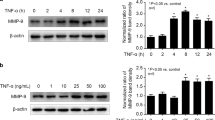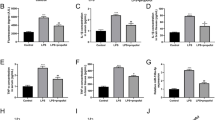Abstract
It has been widely reported that severe neurotoxicity can be induced by the application of propofol, which is closely related to the disruption of the blood-brain barrier (BBB) induced by inflammation and injury in the human brain microvascular endothelial cells (HBMVECs). Benzbromarone is a classic anti-gout agent that has been recently reported to exert anti-inflammatory and anti-oxidative stress effects. In the present study, we aim to investigate the protective property of Benzbromarone against propofol-induced injury on HBMVECs and the underlying mechanism. CCK8 assay was used to detect the cell viability of treated HBMVECs. Oxidative stress in HBMVECs was evaluated by measuring the levels of MDA and mitochondrial ROS. ELISA and qRT-PCR assay were used to determine the production of IL-1β, IL-8, MCP-1, ICAM-1, and VCAM-1 by treated HBMVECs. Calcein-AM staining was utilized to evaluate the attachment of U937 monocytes to HBMVECs. The expression level of Egr-1 was determined by qRT-PCR and Western blot assay. Firstly, the decreased cell viability of HBMVECs induced by propofol was significantly elevated by treatment with Benzbromarone. The increased levels of MDA and mitochondrial ROS induced by propofol were dramatically suppressed by Benzbromarone. Secondly, the excessive production of inflammatory factors (IL-1β, IL-8, and MCP-1) and adhesion molecules (ICAM-1 and VCAM-1) triggered by propofol was pronouncedly inhibited by Benzbromarone. Benzbromarone ameliorated propofol-induced attachment of U937 monocytes to HBMVECs. Lastly, Benzbromarone downregulated propofol-induced expression of the transcriptional factor Egr-1 in HBMVECs. Benzbromarone protected against propofol-induced inflammation and injury through suppressing Egr-1 in human brain vascular endothelial cells.









Similar content being viewed by others
References
Albrecht C, Preusch MR, Hofmann G, Morris-Rosenfeld S, Blessing E, Rosenfeld ME, Katus HA, Bea F (2010) Egr-1 deficiency in bone marrow-derived cells reduces atherosclerotic lesion formation in a hyperlipidaemic mouse model. Cardiovasc Res 86(2):321–9. https://doi.org/10.1093/cvr/cvq032
Azevedo VF, Kos IA, Vargas-Santos AB, Pinheiro GDRC, Paiva EDS (2019) Benzbromarone in the treatment of gout. Adv Rheumatol 59(1):37. https://doi.org/10.1186/s42358-019-0080-x
Barone FC, Arvin B, White RF, Miller A, Webb CL, Willette RN, Feuerstein GZ (1997) Tumor necrosis factor-alpha. A mediator of focal ischemic brain injury. Stroke 28(6):1233–1244. https://doi.org/10.1161/01.str.28.6.1233
Ben-Ari Y, Khazipov R, Leinekugel X, Caillard O, Gaiarsa JL (1997) GABAA, NMDA and AMPA receptors: a developmentally regulated ‘menage a trois.’ Trends Neurosci 20(11):523–529. https://doi.org/10.1016/s0166-2236(97)01147-8
Benzbromarone (2012) LiverTox: clinical and research information on drug-induced liver injury. Bethesda (MD)
Bercker S, Bert B, Bittigau P, Felderhoff-Muser U, Buhrer C, Ikonomidou C, Kerner T (2009) Neurodegeneration in newborn rats following propofol and sevoflurane anesthesia. Neurotox Res 16(2):140–147. https://doi.org/10.1007/s12640-009-9063-8
Bezzi P, Carmignoto G, Pasti L, Vesce S, Rossi D, Rizzini BL, Volterra A (1998) Prostaglandins stimulate calcium-dependent glutamate release in astrocytes. Nature 391(6664):281–285. https://doi.org/10.1038/34651
Bhattacharyya S, Fang F, Tourtellotte W, Varga J (2013) Egr-1: new conductor for the tissue repair orchestra directs harmony (regeneration) or cacophony (fibrosis). J Pathol 229(2):286–97. https://doi.org/10.1002/path.4131
Brambrink AM, Evers AS, Avidan MS, Farber NB, Smith DJ, Martin LD, Olney JW (2012) Ketamine-induced neuroapoptosis in the fetal and neonatal rhesus macaque brain. Anesthesiology 116(2):372–384. https://doi.org/10.1097/ALN.0b013e318242b2cd
Brambrink AM, Evers AS, Avidan MS, Farber NB, Smith DJ, Zhang X, Olney JW (2010) Isoflurane-induced neuroapoptosis in the neonatal rhesus macaque brain. Anesthesiology 112(4):834–841. https://doi.org/10.1097/ALN.0b013e3181d049cd
Cao L, Xu L, Huang B, Wu L (2012) Propofol increases angiotensin-converting enzyme 2 expression in human pulmonary artery endothelial cells. Pharmacology. 90(5–6):342–347
Cheng TH, Chen JJ, Chen CH, Wong KL (2009) Effects of propofol on cyclic strain-induced endothelin-1 expression in human umbilical vein endothelial cells. Anesthesiology. 110(1):74–80
Chidambaran V, Costandi A, D’Mello A (2015) Propofol: a review of its role in pediatric anesthesia and sedation. CNS Drugs 29(7):543–563. https://doi.org/10.1007/s40263-015-0259-6
Czerska M, Mikolajewska K, Zielinski M, Gromadzinska J, Wasowicz W (2015) Today’s oxidative stress markers. Med Pr 66(3):393–405
Creeley C, Dikranian K, Dissen G, Martin L, Olney J, Brambrink A (2013) Propofol-induced apoptosis of neurones and oligodendrocytes in fetal and neonatal rhesus macaque brain. Br J Anaesth 110(Suppl 1):i29-38. https://doi.org/10.1093/bja/aet173
Eskan MA, Jotwani R, Abe T, Chmelar J, Lim JH, Liang S, Hajishengallis G (2012) The leukocyte integrin antagonist Del-1 inhibits IL-17-mediated inflammatory bone loss. Nat Immunol 13(5):465–473. https://doi.org/10.1038/ni.2260
Fu M, Zhu X, Zhang J, Liang J, Lin Y, Zhao L (2003) Ehrengruber M.U., Chen Y.E. Egr-1 target genes in human endothelial cells identified by microarray analysis. Gene. 315:33–41. https://doi.org/10.1016/S0378-1119(03)00730-3
Fredriksson A, Ponten E, Gordh T, Eriksson P (2007) Neonatal exposure to a combination of N-methyl-D-aspartate and gamma-aminobutyric acid type A receptor anesthetic agents potentiates apoptotic neurodegeneration and persistent behavioral deficits. Anesthesiology 107(3):427–436. https://doi.org/10.1097/01.anes.0000278892.62305.9c
Hu H, Tian M, Li P, Guan X, Lian Z, Yin Y, Yu S (2020) Brucella infection regulates thioredoxin-interacting protein expression to facilitate intracellular survival by reducing the production of nitric oxide and reactive oxygen species. J Immunol 204(3):632–643. https://doi.org/10.4049/jimmunol.1801550
Khazipov R, Khalilov I, Tyzio R, Morozova E, Ben-Ari Y, Holmes GL (2004) Developmental changes in GABAergic actions and seizure susceptibility in the rat hippocampus. Eur J Neurosci 19(3):590–600. https://doi.org/10.1111/j.0953-816x.2003.03152.x
Lin MC, Chen CL, Yang TT, Choi PC, Hsing CH, Lin CF (2012) Anesthetic propofol overdose causes endothelial cytotoxicity in vitro and endothelial barrier dysfunction in vivo. Toxicol Appl Pharmacol 265(2):253–262. https://doi.org/10.1016/j.taap.2012.08.013
Liu P, Feng Y, Dong D, Liu X, Chen Y, Wang Y, Zhou Y (2016) Enhanced renoprotective effect of IGF-1 modified human umbilical cord-derived mesenchymal stem cells on gentamicin-induced acute kidney injury. Sci Rep 6:20287. https://doi.org/10.1038/srep20287
Muraya N, Kadowaki D, Miyamura S, Kitamura K, Uchimura K, Narita Y, Hirata S (2018) Benzbromarone attenuates oxidative stress in angiotensin ii- and salt-induced hypertensive model rats. Oxid Med Cell Longev 2018:7635274. https://doi.org/10.1155/2018/7635274
Olyslaegers DA, Dedeurwaerder A, Desmarets LM, Vermeulen BL, Dewerchin HL, Nauwynck HJ (2013) Altered expression of adhesion molecules on peripheral blood leukocytes in feline infectious peritonitis. Vet Microbiol 166(3–4):438–449. https://doi.org/10.1016/j.vetmic.2013.06.027
Ozsoy HZ (2019) Carbonic anhydrase enzymes: Likely targets for inhalational anesthetics. Med Hypotheses 123:118–124. https://doi.org/10.1016/j.mehy.2019.01.005
Sharma HS, Ponten E, Gordh T, Eriksson P, Fredriksson A, Sharma A (2014) Propofol promotes blood-brain barrier breakdown and heat shock protein (HSP 72 kd) activation in the developing mouse brain. CNS Neurol Disord Drug Targets 13(9):1595–1603. https://doi.org/10.2174/1871527313666140806122906
Sumagin R, Parkos CA (2015) Epithelial adhesion molecules and the regulation of intestinal homeostasis during neutrophil transepithelial migration. Tissue Barriers 3(1–2):e969100
Sweeney MD, Zhao Z, Montagne A, Nelson AR, Zlokovic BV (2019) Blood-brain barrier: from physiology to disease and back. Physiol Rev 99(1):21–78. https://doi.org/10.1152/physrev.00050.2017
Takano T, Elimam H, Cybulsky AV (2013) Complement-mediated cellular injury. Semin Nephrol 33(6):586–601. https://doi.org/10.1016/j.semnephrol.2013.08.009
Tseng CY, Chang JF, Wang JS, Chang YJ, Gordon MK, Chao MW (2015) Protective effects of N-acetyl cysteine against diesel exhaust particles-induced intracellular ROS generates pro-inflammatory cytokines to mediate the vascular permeability of capillary-like endothelial tubes. PLoS One 10(7):e0131911
Wang YJ, Yu YR (2011) Protective effects of Astragalus membranaceus on free fatty acid-induced vascular endothelial cell dysfunction. Sichuan Da Xue Xue Bao Yi Xue Ban. 42(1):48–51
Wang Z, Li J, Cho J, Malik AB (2014) Prevention of vascular inflammation by nanoparticle targeting of adherent neutrophils. Nat Nanotechnol 9(3):204–210. https://doi.org/10.1038/nnano.2014.17
Wakuda H, Uchida S, Ikeda M, Tabuchi M, Akahoshi Y, Shinozuka K, Yamada S (2014) Is hyperuricemia a risk factor for arteriosclerosis? Uric acid and arteriosclerosis in apolipoprotein e-deficient mice. Biol Pharm Bull. 37(12):1866–71. https://doi.org/10.1248/bpb.b14-00201
Yang B, Liang G, Khojasteh S, Wu Z, Yang W, Joseph D, Wei H (2014) Comparison of neurodegeneration and cognitive impairment in neonatal mice exposed to propofol or isoflurane. PLoS One 9(6):e99171. https://doi.org/10.1371/journal.pone.0099171
Yang C, Hawkins KE, Dore S, Candelario-Jalil E (2019) Neuroinflammatory mechanisms of blood-brain barrier damage in ischemic stroke. Am J Physiol Cell Physiol 316(2):C135–C153. https://doi.org/10.1152/ajpcell.00136.2018
Young C, Jevtovic-Todorovic V, Qin YQ, Tenkova T, Wang H, Labruyere J, Olney JW (2005) Potential of ketamine and midazolam, individually or in combination, to induce apoptotic neurodegeneration in the infant mouse brain. Br J Pharmacol 146(2):189–197. https://doi.org/10.1038/sj.bjp.0706301
Zhang JX, Lin X, Xu J, Tang F (2019) Hyperuricemia inhibition protects SD rats against fructose-induced obesity hypertension via modulation of inflammation and renin-angiotensin system in adipose tissue. Exp Clin Endocrinol Diabetes. https://doi.org/10.1055/a-1023-6710
Zhang K, Cao J, Dong R, Du J (2013) Early growth response protein 1 promotes restenosis by upregulating intercellular adhesion molecule-1 in vein graft. Oxid Med Cell Longev 2013:432409. https://doi.org/10.1155/2013/432409
Zhao L, Feng Y, Chen X, Yuan J, Liu X, Chen Y, Li Y (2016) Effects of IGF-1 on neural differentiation of human umbilical cord derived mesenchymal stem cells. Life Sci 151:93–101. https://doi.org/10.1016/j.lfs.2016.03.001
Author information
Authors and Affiliations
Corresponding author
Additional information
Publisher's Note
Springer Nature remains neutral with regard to jurisdictional claims in published maps and institutional affiliations.
Rights and permissions
About this article
Cite this article
Huang, Z., Huang, B., Wei, Q. et al. The Protective Effects of Benzbromarone Against Propofol-Induced Inflammation and Injury in Human Brain Microvascular Endothelial Cells (HBMVECs). Neurotox Res 39, 1449–1458 (2021). https://doi.org/10.1007/s12640-021-00387-1
Received:
Revised:
Accepted:
Published:
Issue Date:
DOI: https://doi.org/10.1007/s12640-021-00387-1




